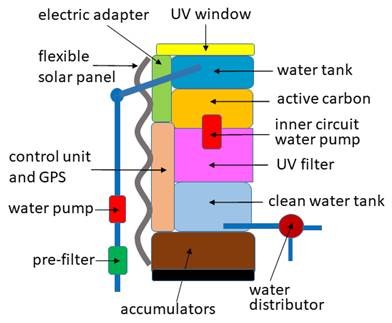Energy is a key driver of national development and energy access is crucial to the delivery of fundamental services such as healthcare and education. Photovoltaics is the most promising renewable energy (RE) technology in terms of availability, cost reduction and efficiency gains. At the same time, providing reliable and safe drinking water will help unlock economic potential by allowing time for education, work and imagination! The World Water Day aims to bring global attention to the world’s freshwater resources and to emphasize that access to clean water has enormous and complex value for households, culture, health, education, economics and the integrity of our natural environment.
In this context, the LEDSOL project is fostering renewable energy to provide clean and safe drinking water based on UV/LED disinfection augmented with classical decontamination and powered by lightweight flexible solar cells. The LEDSOL system is designed to be packed in a self-powered wearable backpack with a positioning engine, which offers an easy to use and affordable technology to local population who is off the grid. We will start at TRL3 and will reach TRL6 by organizing pilots in Algeria Tipaza and Blida regions), Togo (Lomé and surrounding farms) and Romania (Baragan region) to demonstrate the LEDSOL technology in relevant environments. In addition, wastewater from samples collected in Algeria will be also tested in order to estimate the performance of LEDSOL in extreme conditions, where the user doesn’t have access to surface or ground water resources. Water sampling and analysis will be conducted according to international standards methods. Users’ needs and satisfaction will be collected at several steps throughout the project.

Our main contributions in going beyond the state-of-the-art are in the field of UV/LED water disinfection, flexible solar cells, and low-cost robust positioning algorithms. Solar energy conversion efficiencies above 17% through solar panels optimization along with 99.999% pathogen inactivation and at least 85% user satisfaction are some of the quantifiable targets of the LEDSOL project.
The specific objectives addressed by the project are strengthening basic research and technology development while supporting the development and integration of renewable energy in the energy system. These are two of the Multi-Annual Roadmaps established under the UE-AU High Level Policy Dialogue on Science, Technology and Innovation. Within LEDSOL we are exploiting basic research (development of new and specific GNSS algorithms, end-user inclusion methodology) as well as industrial research (solar energy harvesting, data collection and processing) and innovation (sequential UV radiation for water disinfection) to develop new technologies for sustainable clean water from clean energy sources. The main address call topic is “smart -stand-alone systems (SAS)”. In addition, we are also contributing to “mapping joint research and innovation actions for next-step development of RES and integration of RES in sustainable energy scenarios”.
A multidisciplinary consortium comprising partners from Finland, Algeria, Togo, Romania, and Germany is gathering the needed expertise for the project implementation and the objectives set up in the proposal while fostering close and long-term collaboration between Europe and Africa. The proposed technology will give access to affordable energy for clean water production to a wide number of beneficiaries and will maximize the socio‐economic impact through its deployment to remote areas.
Other benefits include fostering education among involved researchers and their university students. The LEDSOL sustainable commercialization strategy developed during the project will take into consideration the creation of jobs for RE‐SAS commercialization, maintenance, and training. It will promote income generated both in Europe and in Africa.
PI in Finland: Elena Simona Lohan, Professor, Tampere University
The other PIs:
- Coordinator: Irina MOCANU, Professor, Centrul IT pentru Stiinta si Tehnologie (CITST), Romania
- PI in Algeria: Hafida LEBIK, Senior Researcher, Ministere de Enseignement superieur et de la recherche Algerien
- PI in Togo: Tomkouani KODOM, Professor, University of Lome,
- PI in Germany: PtJ - Project Management Jűlich, Volker HIELSCHER, Senior Researcher,
Funding source
Academy of Finland, EU
